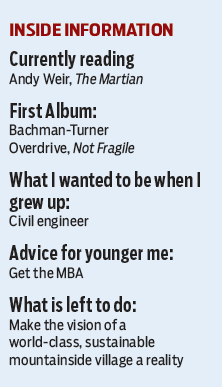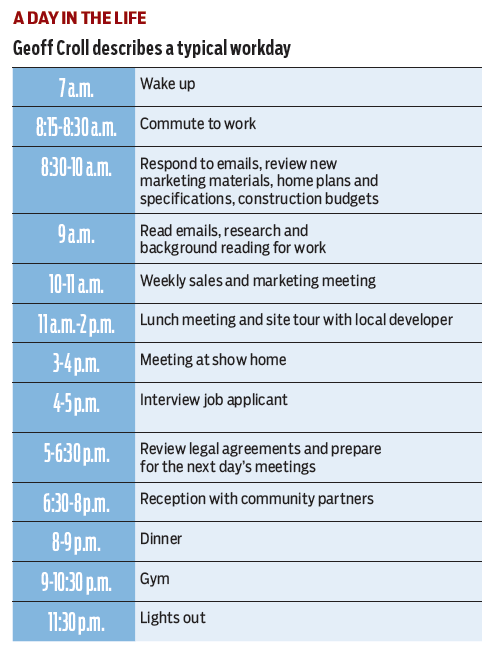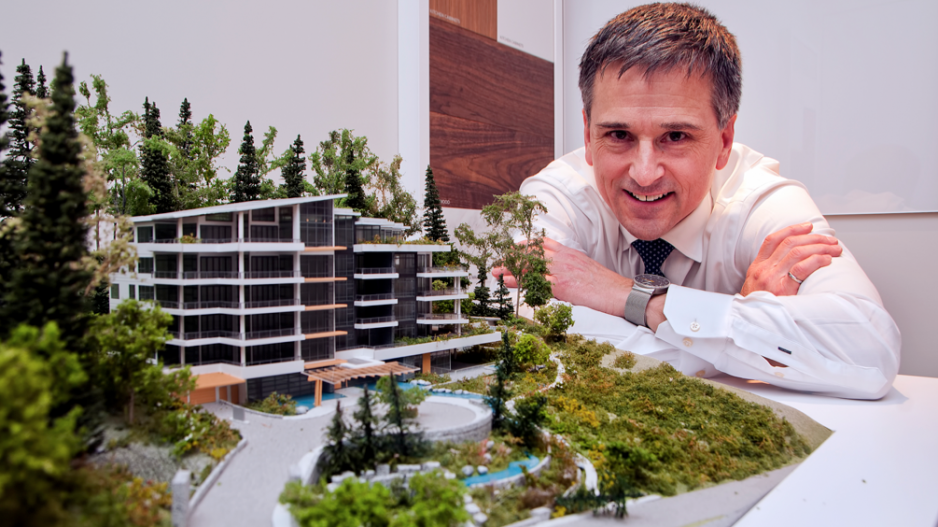Winding through the forest west of Cypress Bowl Road in his black Lexus GX 460, on the slopes below Eagle Lake, British Pacific Properties Ltd. president Geoff Croll speaks with intimate knowledge of the surrounding landscape.
A civil engineer by training, he has worked with the land his entire professional life. And as a lifelong resident of the North Shore, he has explored the backcountry more than have many of his fellow developers.
“My specialty is the land; my passion is dealing with the land,” Croll said. “That’s part of my job, walking this land. I probably know this land better than anybody because I grew up here, I walk my dog up here, I ride my bike up here, I hike up here, I run the trails up here and I understand the recreational values, the ecological values, not to mention the economic values of this land.”
With many developers facing greater pressure to protect the environment, Croll is ideally positioned as one of the most ambitious land plays in the history of B.C. continues to play out on Hollyburn Ridge.
Decades before the province sold the Expo lands to Hong Kong’s Li Ka-shing, West Vancouver sold 4,000 acres of wilderness to investors in London anchored by members of the Guinness family.
The 1931 purchase price was $75,000, with an additional $1 million pledged for community amenities. In today’s dollars those numbers would be $1.2 million and $16 million respectively. Compare that with the $321 million that Concord Pacific agreed to pay for the 205 acres of Expo lands and one gets a sense of just what a steal the British Properties – now home to some of the region’s most prestigious real estate – was.
But it was also a long-term play. Eighty-five years after that initial purchase, no more than half the site has been developed. Of the original 4,000 acres, about 1,000 acres lie above a 1,200-foot contour line established in the 1950s.
“There’s no need to develop them at this point,” Croll said. “It’s there as an asset for both the [owners] and the community.”
His simultaneous awareness of the land as both grounds for private development and a public amenity distinguishes Croll’s approach to managing British Pacific since becoming president in October 2014.

Croll is also the first local president of the company, having grown up in Bayridge, south of the Upper Levels Highway and the area of Eagle Lake of which he speaks so fondly. He now lives with his wife, Susan, just east of the Capilano River in North Vancouver, a location chosen for a simple reason that resonates with many today: “There were more housing choices there at the time.”
Driving through the estates, Croll describes how British Pacific is helping increase the range of housing options in West Vancouver in an area better known for exclusiveness.
Whitby Estates, developed 15 years ago, features large lots with custom residences that rank among the most expensive in Metro Vancouver.
“The council of the day dictated that we have these big, huge estate lots, which you then tend to build big, huge homes on,” Croll said. “There was a feeling, as we built this out, that the community needed a different way of developing, in terms of providing a wider variety of housing types, providing more green space, concentrating density into nodes.”
The feelings found expression in Rodgers Creek, a neighbourhood west of Whitby Estates off the newly completed Chippendale Road. Originally launched in 2006, the project is being constructed by British Pacific’s own in-house building division and follows stringent guidelines that mandate green building practices.
“It was an opportunity to make a difference, to be a leader in the industry, particularly in sensitive hillside development,” Croll said, pointing out key features. “There’s more native landscaping, more focus on stormwater management; there’s a big wetland right there that filters water.”
By preserving 55% of the land in Rodgers Creek as green space, British Pacific was able to relocate density farther west near a planned commercial centre. Attached homes, especially apartments, will account for more than 80% of the new units.

Cypress Village, as the centre will be known, will occupy a five-acre site that was designated to become a rugby pitch until the city manager suggested taking advantage of the expansive view with some kind of development. A public consultation process is slated for this spring to guide the form and configuration of the development.
“It’s a really exciting opportunity to do something from the ground up,” Croll said. “To build a village that people can actually walk to from their home and get their daily needs met, whether it’s a quart of milk, a cup of coffee or a glass of wine.”
What’s equally exciting for Croll is watching an area he originally worked on as a consulting engineer 20 years ago become a new community. Positions with BCR Properties Ltd. and Genstar Development Co. followed that work. When Jim McLean, then president of British Pacific, invited Croll to join the company in 2006, his experience was an advantage and meshed with a long-standing interest in the environment.
He joined as general manager, land, and served as the company’s sustainability officer. He became vice-president, land, and, finally, president.
It’s been a good fit, dovetailing with Croll’s interest in projects that have a significant public interest. British Pacific worked with the acclaimed U.S. landscape architects Olmsted Brothers in the 1930s to lay out the initial form of development, Croll noted, and today the company partners with the West Vancouver Streamkeeper Society as implementation of the original vision unfolds, providing boulders that create fish habitat and shelter the foreshore from high tides and storm surges.
“You can have development and preservation of these ecological, recreational values,” he said. “They’re not mutually exclusive. You can do both, and I see development as a way to provide long-term conservation of a lot of these environmentally sensitive areas.” •




